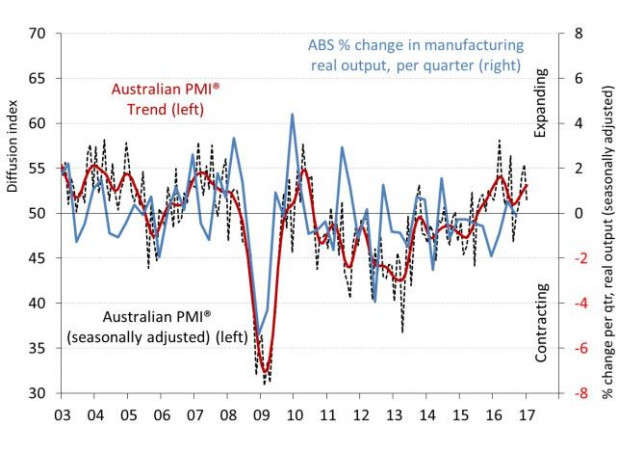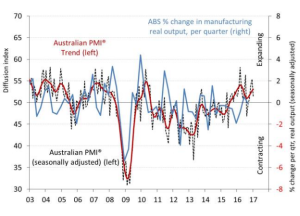
Ai Group’s Performance of Manufacturing Index (PMI) expanded in January for the fourth consecutive month with a reading of 51.2 points.

Although positive, the result indicates reduced activity levels across Australia’s manufacturing sector, with the headline PMI dropping by 4.2 points compared to the December reading.
According to Ai Group’s report, three of the seven sub-indexes in the Australian PMI expanded in January, with the continued expansion of new orders (down 6.9 points to 53.7) a positive indicator for near-term growth.
The reading showed that supplier deliveries (down 5.4 points to 47.0) and sales (down 11.2 points to 47.6) contracted in January, indicating softer demand coming into 2017.
Ai Group said four of the eight manufacturing sub-sectors expanded in January, with machinery & equipment (up 0.4 points to 57.5) and non-metallic mineral products (up 4.8 points to 65.9).
Food and beverages (down 0.9 points to 53.9) and petroleum & chemical products (down 0.5 points to 53.5) also continued to grow, albeit at a slower pace.
Wood & paper products expanded by 1.1 points to 50.5 to exit contractionary territory (readings above 50 indicate expansion in activity), while metal products went up 1.0 point to 49.9 and remained in contraction.
The input prices sub-index increased by 9.5 points in January to 72.3, with some manufacturers “questioning their ongoing viability amid surging energy costs”.
“While an expanding selling prices sub-index (up 6.7 points to 52.1) allows some of these cost increases to be passed on, it has been well outpaced by growth in input costs and wages (up 0.7 points to 63.0) in recent months,” reads Ai Group’s report.
Commenting on the reading, Ai Group Chief Executive Innes Willox said conditions for Australia’s manufacturers remained positive in January despite easing from December’s end-of-year surge.
“While domestic sales slipped and there was a build-up of inventories, exports grew further in January and production was held at December’s levels. The near-term outlook for the sector as a whole was boosted by another lift in new orders,” he said.
“The major emerging concern – particularly among the more energy-intensive manufacturers – is the deteriorating energy price outlook which threatens to stifle the tentative recovery underway in the sector. Conditions are ripe for the boost to investment that would be provided by an easing of the company tax rate.”


















